Summer Reading List: Generosity

Hello, fellow Cal readers!
We invite you to peruse the 2025 edition of the UC Berkeley Summer Reading List for new students! The list is intended as a welcome to incoming students who will be arriving on campus for the fall semester, but we are happy to have any and all avid readers who find their way to this site.
This year’s theme is “generosity,” and the list features a wide range of fiction and nonfiction books recommended for you by enthusiastic Cal faculty, staff, and students. Each one concerns moments of generosity and magnanimous acts that may change the trajectory of individual decisions, or impact larger groups of people. Perhaps these readings will help us all discover generosity in ourselves and others as we navigate through inevitable change and development with intention.
This year marks the 40th anniversary of our Summer Reading List! The entire archive of annual lists, dating back to 1985, is below for you to check out at your leisure.
We wish you happy reading!
Chisako Cole
Continuing Lecturer
College Writing Programs
Tim Dilworth
First-year Coordinator
UC Berkeley Library
Foster*
Claire Keegan

In Claire Keegan’s beautiful novella, Foster, a young Irish girl is sent off by her dysfunctional family to live on a farm with distant relatives, a middle-aged couple. Each has experienced traumas that largely go unspoken, and which are part of what brings them together. Over the course of one summer, the couple’s attention and affection open the girl up as she, in turn, awakens something in them, reminding us of the importance — and the rewards — of generosity in connecting to and helping others. The book is short enough that you can read and enjoy it in one sitting, and then re-read it to savor these vivid characters and Keegan’s powerful gift for storytelling.
Michael Larkin
Continuing Lecturer
College Writing Programs
On Savage Shores: How Indigenous Americans Discovered Europe*
Caroline Dodds Pennock

The book On Savage Shores restores forgotten figures to history, challenging traditional narratives of “exploration” and “discovery.” Caroline Dodds Pennock highlights the stories of marginalized individuals and traces their journeys and motivations, arguing that these individuals should be recognized not only as part of history but as explorers. They ventured to foreign lands, learning new languages and adapting to unfamiliar cultures. Some of them never returned home. This history is pieced together from fragmented records, offering brief glimpses into lives of those who faded into obscurity, such as Diego Colón, a Taíno man abducted by Columbus who became an interpreter, and Malintzin, a Nahua woman whose translation skills aided Hernán Cortés during the conquest of the Aztec empire.
Indigenous generosity is woven throughout these stories, as many of these individuals shared their knowledge, language, and cultural insights with those they encountered, often acting as bridges between worlds. Their willingness to engage and assist, even under difficult circumstances, highlights their resilience and the enduring spirit of giving that shaped their interactions. On Savage Shores asks a simple yet profound question: What must these encounters have been like for those who experienced them? For people arriving in Europe as their societies were ravaged by disease and colonization, what did they make of royal courts and urban poverty? This work seeks to provide a deeper understanding of their perspectives.
Liladhar Pendse
Librarian for East European and Eurasian Studies
and Librarian for Latin American Studies
UC Berkeley Library
Solito: A Memoir*
Javier Zamora
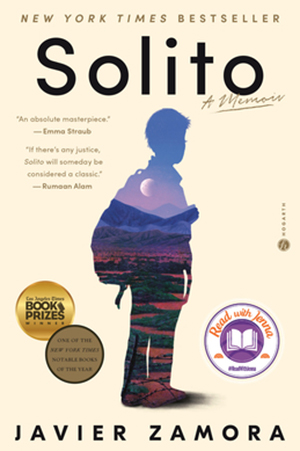
Javier Zamora’s Solito: A Memoir details his journey from his native El Salvador to be reunited with his parents in the United States. His family trusts the coyotes to deliver the 9-year-old safely, but it is really a few of his fellow migrants — strangers before the crossing — who put themselves at even greater risk to look out for him on the incredibly harrowing journey. They carried him when he couldn’t walk, shared food and water with him, claimed him as part of their family when caught by border patrols, and most importantly kept him inspired to keep moving ahead to be reunited with his parents. Because of what they did, he survives what few do. The generosity of some of his fellow travelers is instructive and inspirational. Now a poet, Zamora is able to masterfully and lyrically recount his experience. Bonus: Zamora is a Berkeley alum.
Shannon Buckley-Shaklee
Program Advisor
Department of Sociology
(Berkeley International Study Program)
A Psalm for the Wild-Built
Becky Chambers

Let this science-fiction story carry you to another world. Robots have gained self-awareness, left their jobs, and disappeared into the wilderness. Humans and robots continued to evolve on their own for centuries. Then, one day, a monk encounters a robot. This is a tale about meaning and purpose; identity and nature; the generosity of listening to and learning from others; and the kindness of being curious and open-minded. If you are looking for a mental break from the daily news, this is a brief glimpse into a more utopian world with two characters that are refreshingly humane. If you like it, the sequel is A Prayer for the Crown-Shy (Monk and Robot series, book #2).
Elizabeth Dupuis
Senior Associate University Librarian
and Director of Doe, Moffitt, and subject specialty libraries
UC Berkeley Library
Tropic of Orange*
Karen Tei Yamashita
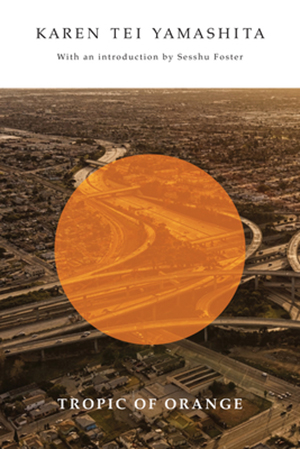
Tropic of Orange by Karen Tei Yamashita explores the interconnected lives of a diverse cast of characters in contemporary Los Angeles. Through a multiperspective narrative, the book delves into themes of cultural fluidity, social justice, and the power of human connection. The story weaves together the lives of immigrants, activists, and everyday people, each navigating their own struggles while finding moments of solidarity and empathy. This reflects the complexity and diversity of modern urban life. It highlights how acts of generosity and kindness can connect people from different cultural backgrounds and foster a sense of community. Through its exploration of interconnectedness and the human capacity for empathy, Tropic of Orange reflects on the potential for positive change and the transformative power of collective action.
Xiyue (Rachel) Qin
Legal Studies & Economics
Class of 2025
Spain in Our Hearts: Americans in the Spanish Civil War, 1936–1939*
Adam Hochschild

The sacrifice of one’s own life for a noble cause might be the greatest act of generosity one can imagine. In the late 1930s, some 2,800 Americans illegally embarked for Spain to defend the democratic republic that had been violently besieged by the dictator General Francisco Franco and his Nationalist army. The diverse group of volunteers came from the urban centers but also from nearly every state, and a third of them would never return home. They included longshoremen, sailors, teachers, students, novelists, poets, nurses, doctors, barbers, carpenters, florists, truck drivers, plumbers, salesmen, tailors, artists, cabbies, musicians, and factory workers of all types. Adam Hochschild — journalist, historian and lecturer in the School of Journalism — brings history alive through the stories of many of these little-known heroes, a dozen or so Golden Bears who magnanimously enlisted in the Spanish Civil War to keep fascism, supported by Hitler and Mussolini, from spreading in Europe. One Cal alum, Robert Hale Merriman, went missing in action on April 2, 1938, near Corbera d’Ebre (Tarragona). This year, a plaque from the University of Barcelona will be installed on the Berkeley campus in his honor and for all those who risked everything to serve in the international brigades in this long-overlooked conflict.
Claude Potts
Librarian for Romance Language Collections
UC Berkeley Library
Patriot*
Alexei Navalny

Alexei Navalny (June 4, 1976-Feb. 16, 2024) was a Russian political activist who was severely poisoned with a Novichok nerve agent in August 2020. Navalny blamed the poisoning on Russian President Vladimir Putin and was incarcerated in Russia on Jan. 17, 2021. While in prison, Navalny continued his activism, in part, through social media posts of investigations into corruption in the Russian government. He was awarded the Sakharov Prize for his work on human rights in 2021. Navalny died in prison and was recognized by Amnesty International as a prisoner of conscience. His brilliant memoir begins with a graphic description of his poisoning and recovery and chronicles his activism and life in prison. It is a personal narrative by someone who gave everything for a cause he believed in.
Lisa Goldberg
Professor of the Practice of Economics
The Nightingale
Kristin Hannah

The Nightingale teaches lessons of grit, determination, generosity, and heroism as we learn more about German-occupied France during World War II. The book focuses on two sisters, Vianne and her rebellious younger sister, Isabelle. They are estranged during the war and we see how they bravely navigate differing viewpoints and experiences through the paths they take. The theme of generosity and resilience is woven throughout the historical novel, particularly in the sacrifices each sister makes for survival, freedom, and for the people they love.
Isabella Zintel
Media Studies and Public Policy
Class of 2022
Snow Falling on Cedars
David Guterson

What do you do to help your neighbors in trouble, incarcerated because of their origin? What if you are one of the people being forcibly removed from your home? These are the questions that many faced after President Roosevelt’s Executive Order 9066, signed in 1942, expelled more than 100,000 Japanese Americans from their homes and incarcerated them at 10 inland prison camps. David Guterson sets his novel on a fictional island called San Piedro and traces the reverberations of the expulsion and its lasting effects on the relationships and everyday life of a small community, including the corrosive effects of racism and xenophobia.
The novel centers around the trial of a Japanese American fisherman, Kabuo Miyamoto, for the murder of Carl Heine, another fisherman on the island. Carl’s father was one of the islanders who was generous and a good friend to the Japanese American community. Kabuo is a distinguished war veteran, but is also involved in a long-running property dispute which is seen as a motive for the murder. Investigating the murder is the editor of the island’s small newspaper, Ishmael Chambers, who has been in love with Kabuo’s wife, Hatsue, since high school. Ishmael loosely represents real-life couple Walt and Millie Woodward, editors of the Bainbridge Review, the only West Coast newspaper editors to speak out against the expulsion and incarceration. Will Ishmael overcome his own war experience and conflicted feelings about Hatsue to be as generous as his real-life counterparts were? Read this beautifully haunting and evocative novel to find out!
Ann Glusker
Librarian in the Social Sciences Division
UC Berkeley Library
Cue the Sun!: The Invention of Reality TV
Emily Nussbaum
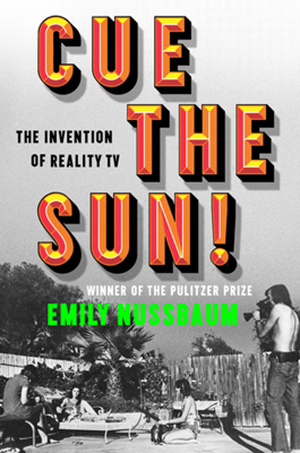
Long before content creators peddled their wares on social media, there were seemingly ordinary people living out their purportedly unscripted dramas for all to see on reality television. In Cue the Sun! (a great title), Pulitzer Prize-winning author Emily Nussbaum reviews the history of reality television. From its earliest iterations to its current forms, this genre has been fraught with controversy throughout — fully equipped with its cast of “preditors” (a fun portmanteau) and low- or no-wage workers, prompting many a Hollywood actors’ strike. From the questionable ethics of filmed social psychology experiments to the cinéma vérité ideals of An American Family, one comes away with discomfiting questions around boundaries and respect for individuals when the private meets the public — the tragedies of when the ordinary and the humdrum meet instant fame, and the way that fame can wreak its havoc. Coming of age when reality shows hit prime time, I did not realize until reading this book that this genre has undeniably shaped my — and our — perspective on nearly everything. From the destigmatizing effect of Bravo’s Queer Eye to the self-important impression management of The Apprentice, this book made me reflect on how reality television has exerted a lasting, powerful impact on the bending and shaping of the reality that stands before us today.
Nancy H. Liu
Associate Clinical Professor
Department of Psychology
Stay True: A Memoir*
Hua Hsu
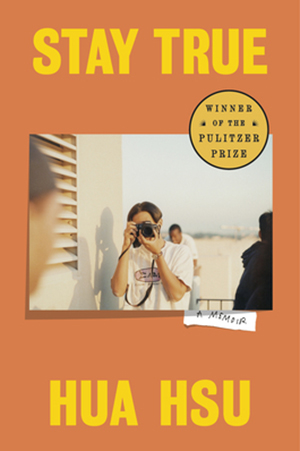
As Hua Hsu navigates the college experience at UC Berkeley, living alongside counterculture and punk rock scenes, he learns how to appreciate what is near. One of the lessons he learns is how friendships are built on unconditional reciprocity and generosity. With each person we meet, books we read, and places we encounter, marks of ourselves are left behind. This is a continuous cycle, and in it, we can choose connection, love, and meaning. Small acts of kindness and giving just a little bit of yourself to what is near, can truly transform a world.
Alex Simpson
Environmental Science
Class of 2028
Small Things Like These*
Claire Keegan
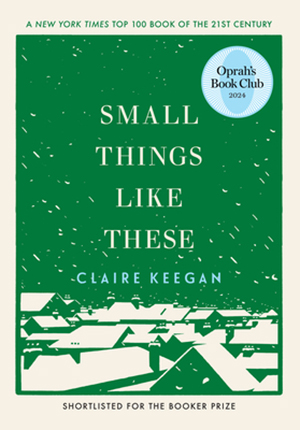
Set at Christmastime in 1980s Ireland, a man witnesses the suffering of a young woman that makes him consider his past and decide whether or not to stand against his community in order to ease the pain of another. Acts of beneficence and bravery throughout the novel illustrate what a big impact acts of generosity can have on the lives of others.
Suzanne Wones
University Librarian
UC Berkeley Library
Small Things Like These assures us we are all capable of doing the right thing, and that goodness, like misery, can be handed on from man to man. It is a literary state of grace.
jeannine miles
Library Business Services
UC Berkeley Library
Coming of Age
Lucy Foulkes
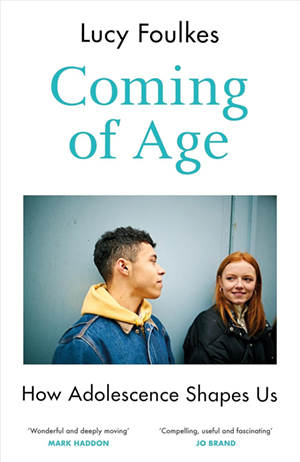
This psychology book examines how we construct foundational narratives about ourselves in the teenage years using first-person stories collected by survey. It challenges us to be more generous toward teenage struggles, which are often ridiculed, and to be particularly generous toward our own teenage self. Incoming students are at the tail end of the adolescent period and may find this book a helpful guide for overcoming past struggles, choosing healthy relationships, and finding meaning and purpose in their studies.
Linda Wilbrecht
Professor
Department of Psychology
Everything Sad Is Untrue (A True Story)
Daniel Nayeri
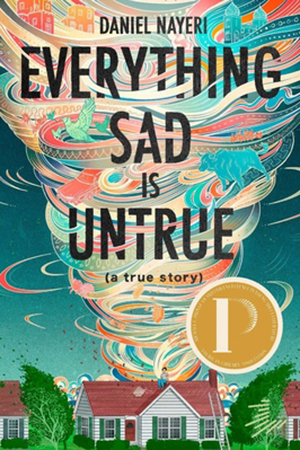
Memoirs often seem to follow the same storyline these days. Not this book. Although written for middle schoolers, even those no longer young at heart will sense their hearts expanding while reading this autobiographical novel. Joining the narrator’s immigration journey from Iran to Oklahoma, I found myself weaving those circular and nonlinear paths, passing through shifting understandings and new discoveries of cultural norms, relationships, and perceptions. These discoveries are true to life, filled with their share of complexity and complicated, imperfect people. And often there are no clean resolutions or happy endings; we simply go on, imbibe these realities, and maybe gain a bit more humanity in the process.
Nancy H. Liu
Associate Clinical Professor
Department of Psychology
The Grapes of Wrath
John Steinbeck

The Grapes of Wrath is a literary representation of California during the Great Depression and the Dust Bowl migration in the 1930s. As the Joad family is forced from their farm in Oklahoma and into the fields of California, they are met with the reality that, like themselves, thousands of others are starving. Yet, from the moment they enter the government camp, the Joads are met with people who rally together and care for each other, offering their meager meals and modest clothes to share. Even amid — and perhaps despite — scarcity, The Grapes of Wrath highlights generosity as one of the most valuable human characteristics during challenging times.
Vesna Rodic
Lecturer
French Department
The Siren’s Call: How Attention Became the World’s Most Endangered Resource
Chris Hayes
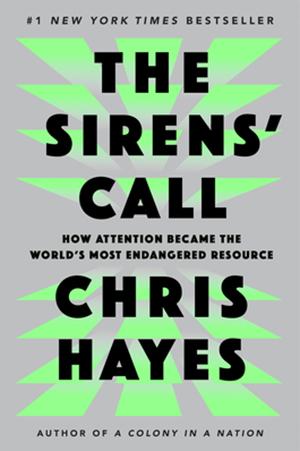
You’re probably reading this on a device that is likely to buzz, ring, or otherwise demand your attention at any moment. You may be doing so when there are live people about, whom you might instead be talking to and learning from. Wondering why you’re putting up with that? Chris Hayes provides an informed, must-read, well-written tour of how technology and enterprise systematically distract our attention from other people and ourselves. He draws on real science and research, and his own career in media. Whether you’re starting from an interest in recent history, psychology, business, politics, or tech, this book is for you.
Michael O’Hare
Professor of the Graduate School
Goldman School of Public Policy
An Immense World: How Animal Senses Reveal Hidden Realms Around Us*
Ed Yong
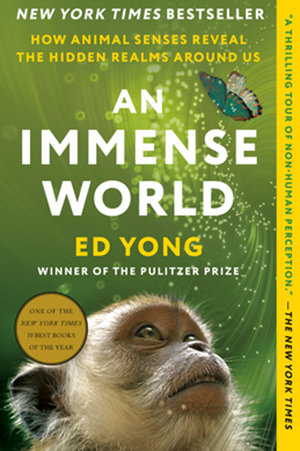
In An Immense World, Ed Yong explores fascinating realms of non-human perception. Not only does he fill the book with curious discoveries, such as how snakes used their forked tongues to smell the world and how catfish have taste buds all over their bodies, he also encourages us to consider perspectives extremely different from our own. Further, he recounts how much scientists, and thus we humans, still don’t know, thus reminding us to approach the world with humility and wonder. In doing so, he asks readers to be generous in our understanding of other beings, to consider both non-human experiences, as well as that of other humans.
Kim Freeman
Continuing Lecturer
College Writing Programs
* Electronic access requires CalNet authentication.
Summer Reading background
About
Since 1985, the University has offered the UC Berkeley Summer Reading List for New Students as one of the welcomes to the incoming classes of freshmen and transfer students. Whether you’re a new student at Cal, an alum, a UC Berkeley employee, or an avid reader who has found your way to our site, we invite you to have a look at the current list of suggestions as well as an archive of past years’ reading lists.
These readings aren’t required; they’re offered for pleasure. They’ve been suggested by Cal faculty, staff, and students as great readings that will introduce incoming students to a small slice of the intellectual life of the university and perhaps send them exploring the Library’s rich collections. Also, the readings aren’t selected by us, the list curators. Instead, we ask people across the Cal campus for their suggestions of great readings that would fit within a given theme, and then see what we get. (Also, we don’t accept suggestions from publishers or authors.) The list is always a potluck, always eclectic, and always full of worthwhile readings. We feel sure you’ll find something on one of these lists that will spark your interest.
If you have any questions about the list, please email Chisako Cole or Tim Dilworth.
Archive
2024: Defining Moments
2023: (Re)Writing the Rules
2022: Illuminating Communities
2021: Lift Our Gazes
2020: Connections
2019: Between Worlds
2018: Fiat Lux: Let There Be Light
2017: What Can We Change in a Single Generation?
2016: A Collection of Firsts
2015: Summer Sampler
2014: Speak Freely. Read Freely
2013: What Would Seniors Read?
2012: Revolutions
2011: Social Media
2010: Education Matters
2009: Best Books About Science
2008: Bio-Graphy: Writing a Life
2007: Survival
2006: Books for Future Presidents
2005: Great Discoveries, Voyages, and Adventures!
2004: Now That’s Funny
2003: War & Peace
2002: Banned Books
2001: Favorite Book When I Was 18
2000: Great Books Written by Berkeley Faculty
1999: Selected by faculty involved in residence hall activities
1997: Selected by Freshman & Sophomore Seminar students
1995: Selected by faculty and staff who teach freshman seminars
1991: Selected by American Cultures’ Fellows and staff
1990: Selected by Berkeley Librarians
1989: Selected by the chairs of various departments
We’ve compiled a list of the books and authors (opens a Google document) recommended since the Summer Reading List’s inception in 1985.